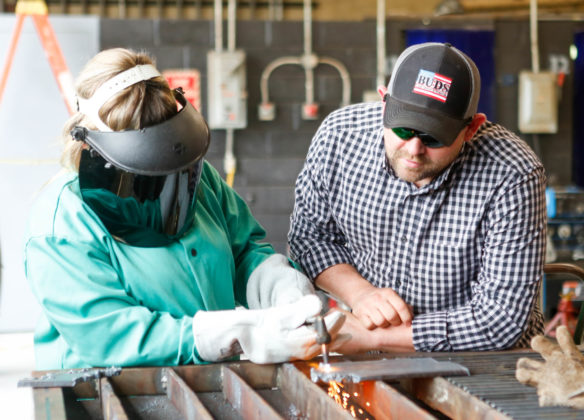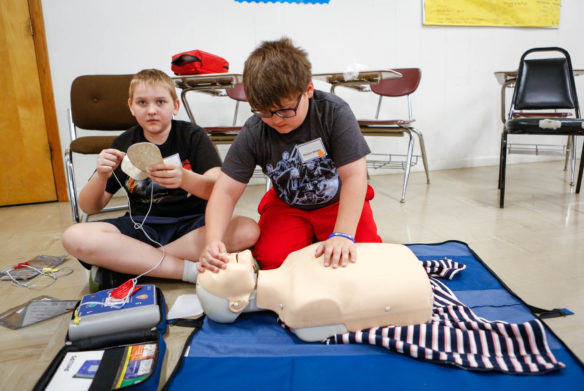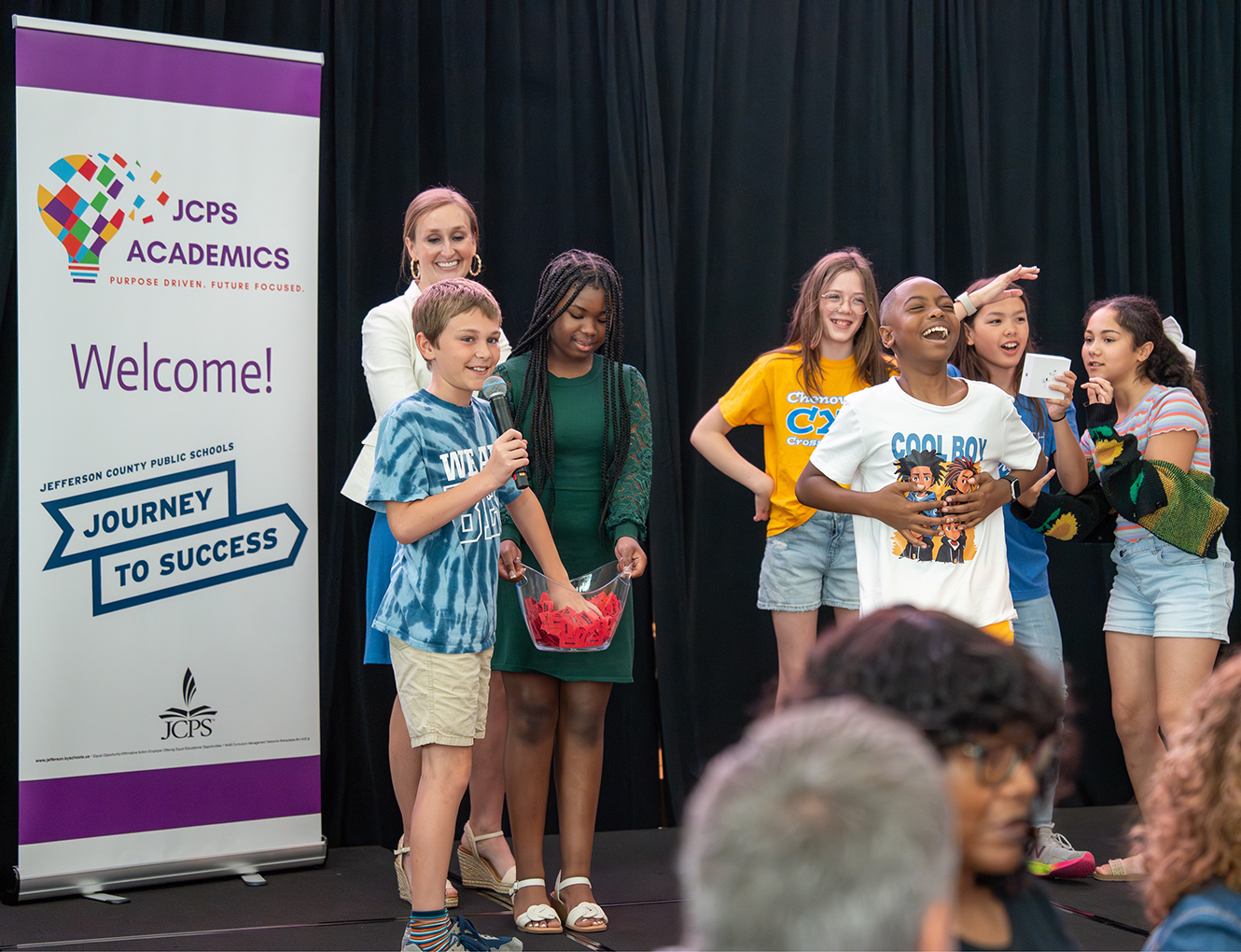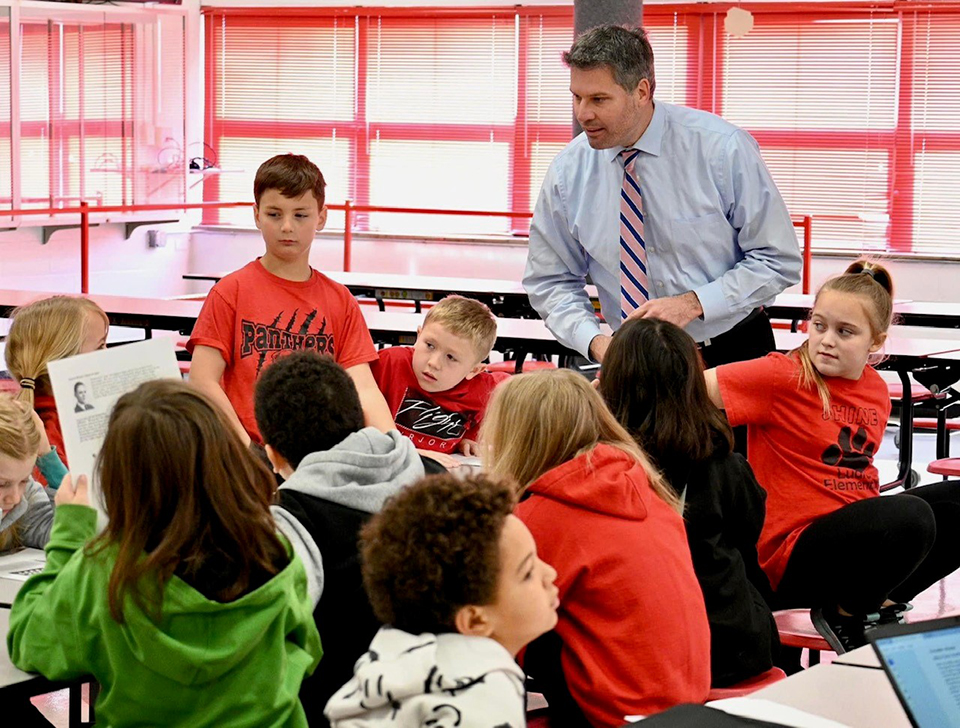
Alexis Stone, an 8th-grade student at Mason County Middle School, uses a cutting torch as welding instructor Adam Wallingford looks on. Stone was among 18 students attending a camp designed to expose students to nontraditional career fields. Twelve camps were held at area technology centers across the state in May and June.
Photo by Mike Marsee, May 30, 2018
By Mike Marsee
michael.marsee@education.ky.gov
There’s no way to know whether the girl behind the welder’s mask will someday make her living with a cutting torch or whether the boy bandaging his friend’s arm will work in the medical field.
They will, however, have plenty of time to consider those options after having been exposed to nontraditional career fields a little sooner than they might otherwise have been. The Kentucky Department of Education (KDE) and several of the state’s area technology centers have been encouraging middle school students to think beyond career stereotypes at a series of camps this spring.
Students who will enter the 7th and 8th grades this fall were invited to the camps, which were held at 12 ATCs across the state – from Belfry ATC in the east to Mayfield-Graves County in the west – in May and June. They spent two or three days getting a look at career pathways that typically are populated by people of the opposite gender in hopes that some of them might study in those areas in a few years.
Helen Jones, KDE’s consultant for the Carl D. Perkins Career and Technical Education Act in the Office of Career and Technical Education (OCTE), said the nontraditional camps have the potential to address long-term economic development concerns in their communities.
“The nontraditional camps are introducing students to fields which traditionally have higher-paying careers often dominated by one gender, for instance, girls in welding or boys in nursing,” Jones said.
Jones said the camps also support the goal of the Perkins Act, which provides federal funding for the improvement of career and technical education programs. The act is designed to develop the academic and career and technical skills of students who enroll in CTE programs to ensure that the United States remains competitive in a global economy.
Kentucky must meet performance measures outlined in the Perkins Act, one of which is enrollment in and completion of nontraditional CTE programs.
Jones said data on the enrollment and completion of students participating in nontraditional career pathways shows that high schools, area technology centers and postsecondary institutions typically struggle in that area.
“Over the years, KDE has tried several initiatives to address nontraditional participation and completion, such as training for district staff,” she said. “Years ago, summer camps was one of the initiatives that provided evidence of improving the nontraditional participation. Introducing students in middle school to those fields, to career paths that they may not necessarily have thought about, is one of most successful ways to do that.”
The camps were reintroduced last year, and Jones said the eight camps held were attended by more than 100 students.
“The teachers seemed to enjoy it and the kids had a ball,” she said. “All the ATCs that participated last year came back this year, so whatever happened last year, they felt it was worthwhile to do it again. And the instructors are the ones pushing it, so that was encouraging.”
Ty Burkhart, the electrical technology instructor at Mason County ATC, was all for having a camp at his school.
“I think this is the most awesome thing we could do to try to get new students, especially female students who can come in, check things out, have some fun with it,” Burkhart said. “It’s kind of a crash course, but it still gives them some ideas on what they can do in the future, instead of just what males and females stereotypically do.”
Jones said it’s also a good sign that more ATCs were interested in hosting camps this year, and she said she would like to see even more of the state’s 53 ATCs sign on to do so.
This was the first year for a nontraditional camp at Mason County ATC. The school received a $5,000 grant through OCTE that covered the costs of the camp, including bus transportation and items participants could take home with them.
Some of the camps have attracted as many as 30 students. Eighteen students primarily from Mason and Robertson counties attended the camp at Mason County ATC, which offers five program areas – automotive, electrical technology, machine tool technology, welding technology and health science.
Adam Wallingford, the welding technology instructor at Mason County ATC, said he thought the camp went well.
“It’s interesting to see how nontraditional students react to nontraditional trades,” Wallingford said. “They’ve done very well. They’ve been really responsive and active in the activities we’ve had.”
The girls in Mason County rotated through all four of the traditionally male-dominated program areas during the camp’s two days. The boys spent much of their time in the health science wing, enough time to learn a number of first aid skills and to complete the American Heart Association’s Basic Life Support course.
The girls learned about oil and tire changes in automotive and how to make brass and aluminum rings in machine tool technology. They also learned how to wire a circuit and bend conduit in electrical technology, and how to use a cutting torch in welding technology.

Preston Moore, right, a 7th-grade student at Robertson County Middle School, practices CPR technique as classmate Ephraim Hughes prepares to attach an automated external defibrillator to the dummy during the nontraditional camp at Mason County Area Technology Center. Boys at the camp learned first aid skills and completed a lifesaving course, while girls rotated among the school’s four traditionally male-dominated program areas.
Photo by Mike Marsee, May 30, 2018
Each boy took home a first aid kit in addition to his certification, and the girls took a few things home as well, including metal plates on which they had written their names with a cutting torch, a small auto repair kit, pliers and a circuit tester.
Jones said participants in other camps have worked on wooden chairs and benches and have made their own jumper cables, which they took home with them.
Each of the ATCs that conducted the camps partnered with postsecondary institutions, which provided speakers who talked about transitioning from high school to postsecondary and the job potential and earnings potential associated with continuing education. Some of them took the students on field trips, and they also brought in speakers from nontraditional fields, though Mason County ATC Principal Jeremy McCloud said that wasn’t always easy.
“For example, we were trying to find a female electrician and none of us could think of anybody. We don’t know any in this area,” he said. “So why is that the case? We want to get students interested in those fields.”
He said he hopes some seeds were planted with the students who came to the nontraditional camp.
“Once we go and start doing our recruiting their freshman and sophomore years, hopefully they’ll remember us and be able to tell a lot of their friends, ‘I was over there at summer camp and it was pretty cool,’” McCloud said.
Burkhart said he could see sparks of interest in the students he worked with.
“They asked very appropriate questions,” he said. “Some of them had some knowledge of electricity and some of them had no prior knowledge whatsoever, but they were laughing, they were smiling. Several of them said they’d like to take the class and some of the other classes throughout the building.”
Jones said the ultimate measure of the camps’ success will be found a few years from now in the data that might indicate whether more students enrolled in and completed a nontraditional career pathway.
“Then we’ll be able to see if this is really having an impact,” she said.
MORE INFO …
Ty Burkhart ty.burkhart@mason.kyschools.us
Jeremy McCloud jeremy.mccloud@mason.kyschools.us
Adam Wallingford adam.wallingford@mason.kyschools.us
Helen Jones helen.jones@education.ky.gov



Leave A Comment